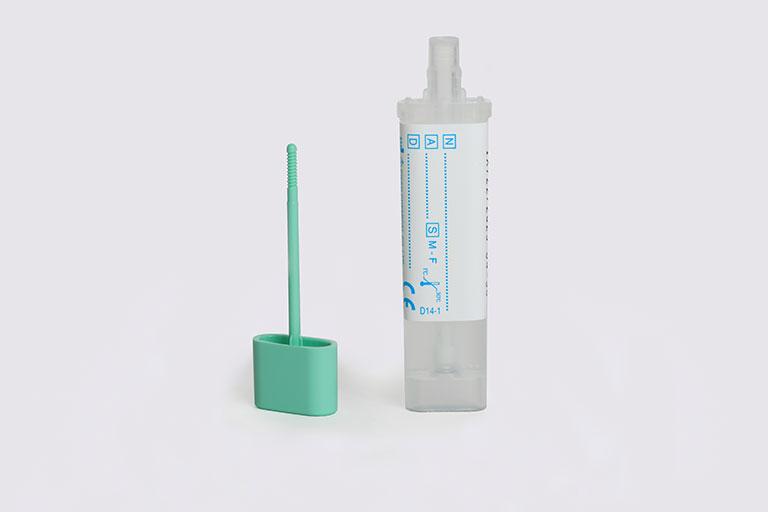
When should you start screening for bowel cancer?
Key Takeaways
- Bowel cancer is common and rates are going up in the under 50s.
- However, many in the UK aren’t invited for screening until 60.
- In the USA, bowel cancer screening starts at 45.
- We recommend starting screening for bowel cancer with a qFIT test in your 40s.
- If you have a first degree relative with bowel cancer you may need to start screening even earlier.
Bowel cancer is the 4th commonest cancer in the UK. 1-in-15 men and 1-in-18 women will get bowel cancer in their lifetime1. One of the main weapons we have against bowel cancer is screening. Testing yourself for bowel cancer even when you have no symptoms can pick it up early, when it’s easiest to treat. The big question is - when should you start screening for bowel cancer?
What is bowel cancer screening and why is it so important?
There are two main reasons to test for bowel cancer. Firstly, you might have symptoms which could be a sign of bowel cancer such as bleeding from the bottom, stomach pain, a change in your usual bowel habit, weight loss or the sensation that you need to open your bowel even though you’ve only just been.
Unfortunately, bowel cancer often doesn’t give you any symptoms until a relatively late stage when it’s harder to treat. That’s why we have “screening”. Screening means that you’re testing yourself for bowel cancer even though you don’t have any symptoms. The aim is to pick up any cancer at an earlier stage, when it’s easier to treat and, hopefully, cure.
We have good data from research studies to show that screening for bowel cancer with a "qFIT test" nearly halves your risk of dying from bowel cancer2. But what is a qFIT test and how does it work?
So how does bowel cancer screening work?
In the UK and many other countries, we have a national Bowel Cancer Screening Programme that uses a quantitative faecal immunochemical test - or qFIT for short - to test for minute amounts of blood in your stool that you wouldn’t be able to see.
The great thing about the qFIT test is that it’s a really simple stool test you can do from home and just post to the lab. No need to go into a hospital or see a doctor. You can even get a qFIT test from us at Selph.

Blood in the stool can be a sign of bowel cancer so, if the qFIT test is positive, you generally go on to have a camera test - or colonoscopy - to look inside the bowel to see if the blood is caused by a tumour or something else.
There’s two important things to be aware of when it comes to screening with qFIT tests. Firstly, they don't tell you whether or not you have bowel cancer. They just tell you if there’s blood in your stool. Blood in your stool can be a sign of bowel cancer but lots of other conditions can cause blood in the stool such as simple piles (haemorrhoids).
Secondly, qFIT tests also tell you how much blood is in your stool. In general, the larger the amount of blood in your stool, the more likely it is to be caused by bowel cancer.
If you’d like to know more about how qFIT tests work and what the results mean, we’ve got a great article that you should definitely check out.
Sounds great but what are the downsides to qFIT screening for bowel cancer?
Although bowel cancer screening with qFIT undoubtedly saves lives, it’s important to be aware that it’s not perfect.

As we’ve said, there are lots of causes for blood in your stool and many are a lot more common than bowel cancer. This means that most people who have a positive qFIT test actually do not have bowel cancer, they have something else. Unfortunately, they’ll still have to have a colonoscopy to look inside the bowel to be sure and suffer with the worry of having a positive test.
On the other hand, some people can have bowel cancer but still have a negative qFIT test. This is because bowel cancers don’t bleed all the time so sometimes there isn’t blood in the stool to detect. However, data suggests that if a qFIT test doesn’t detect any blood in your stool, the risk of having bowel cancer is very low - around 1 in 500 to 1 in 10003.
So when should I start screening for bowel cancer?
Your risk of having bowel cancer goes up as you get older and roughly 90% of bowel cancers are found in people over the age of 504. This means that there’s little benefit in checking for bowel cancer at a young age because you’re so unlikely to have it.
In the USA, the recommendation for most people is to begin bowel cancer screening at 45. However, the number of people being diagnosed with bowel cancer under the age of 50 is actually on the rise and some studies have suggested that people could benefit from bowel cancer screening from 405.

Guidelines in the UK are different to those in the US and bowel cancer screening is offered to people from the age of 60. However, there is a plan to reduce the start age to 50 years by the end of 2025, which is being rolled on regionally across the UK. This still isn’t as inclusive as the US recommendations.
Another major difference between the UK and the US screening programmes (and many other countries) is the qFIT threshold that counts as “positive”. In England, the screening programme only considers a qFIT test as “positive” if the level of blood in the stool is over 120µg/g. In the US, it’s 10µg/g. This means that far fewer people would be considered positive and go on to have a colonoscopy in England compared to the USA.
So why is there such a large difference between bowel cancer screening in the UK vs the USA? Is there something special about people in the UK? Unfortunately not. We just don’t have the financial and medical resources of countries such as the USA and Australia to support a more inclusive bowel cancer screening programme. This is almost certainly one of the reasons people in the UK are less likely to be diagnosed with bowel cancer at an early stage or to live longer than five years after diagnosis compared with other countries6.
Ultimately, when to begin screening for bowel cancer in the UK is a personal choice. You could wait to be invited to the Bowel Cancer Screening Programme between 50 and 60 or take a more proactive approach that’s closer to recommendations in other countries and start earlier. Given the rising rates of bowel cancer in the under 50s, we’d recommend starting bowel cancer screening in your 40s and testing every 1-2 years for most people.
It's simple to get a screening test for bowel cancer from us at Selph. It's exactly the same as the test used in the NHS but you also get the actual qFIT value and a report from one of our doctors with guidance on what action to take.
But what if I have a family history of bowel cancer?

If you have a first degree relative (parent, sibling or child) who has been diagnosed with bowel cancer you’ll have a higher risk of developing bowel cancer yourself, compared to the general population. In the USA, if you have a first degree relative with bowel cancer the recommendation is to begin screening at 40 years of age or 10 years before the earliest case of bowel cancer in the family7.
In the UK, the guidelines are stricter and only recommend starting screening at 40 years of age if you have three first degree relatives affected with bowel cancer8. You may be eligible for screening starting at age 55 if you have two first degree relatives with bowel cancer or one relative diagnosed under 50 years.
If you have a family history of bowel cancer it’s often recommended to screen directly with a colonoscopy (rather than a qFIT test). Of course, you can choose to do both. If you’re concerned about your family history and bowel cancer, we would strongly recommend discussing this with your doctor.
When should I stop screening for bowel cancer?
In the UK, you’ll stop being invited for bowel cancer screening from age 74. This isn’t because your risk of bowel cancer suddenly disappears at 74. On the contrary, your risk keeps going up as you get older. However, beyond 74 years, the average person is more likely to die from other causes (e.g. heart disease) and less likely to be fit enough for an operation for bowel cancer if they were diagnosed.
While this might be true for the “average” person, the important question is, is this true for you?

If you’re a fit and healthy 74 year old, making the most of life - and that’s exactly what we help people achieve at Selph - we would strongly recommend that you continue screening for bowel cancer. This is specifically recognised in the USA where people continue screening well into their 80s if they’re in good health.
The bottom line
Bowel cancer is very common and by the time you get symptoms it’s often quite advanced. Bowel cancer screening with a qFIT test can pick up bowel cancer earlier, when it’s easier to treat and cure.
Rates of bowel cancer are increasing in the under 50 age group so we recommend following the lead of countries, such as the USA, and screening every 1-2 years, starting in your 40s. If you have a family history of bowel cancer you may need to start even earlier but it’s often a good idea to discuss this with your doctor.
We're on a journey to becoming the first longevity company and we'd love to bring you along.
Sign up to get our twice monthly Selph Improvement newsletter which is packed with evidence-based tips to optimise your health.
We'll also keep you up-to-date with articles, products and services that are all designed to turn the latest science into more years of better health for you.
